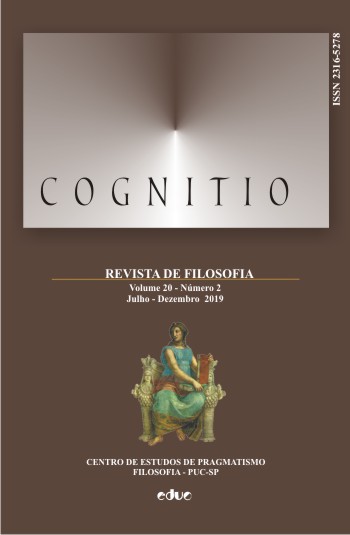Qualidade e forma na filosofia de Charles S. Peirce
DOI:
https://doi.org/10.23925/2316-5278.2019v20i2p343-377Palavras-chave:
Cosmologia, Forma, Informação, Peirce, Qualidade, Representação, Semiótica.Resumo
O principal objetivo deste artigo é apresentar uma identidade possível entre os conceitos de forma e de qualidade na filosofia de Charles Sanders Peirce (1839-1914), por meio de seus argumentos em sua Semiótica e em sua Cosmologia. Em outras palavras, nosso objetivo é mostrar que a primeiridade consiste em uma forma, parte constitutiva da natureza da terceiridade, na medida em que a tendência à generalização ou à aquisição de hábitos estava prefigurada na origem do cosmos. De natureza indutiva, o passo do nada absoluto para uma unidade de qualidades prefigura um universo inteligível de natureza formal. Esta unidade já pode ser considerada uma restrição de uma potencialidade de força maior presente naquele nada germinal: a primeira categoria é configurada, então, como sendo de natureza potencial qualitativa. O adjetivo “qualitativa” apresenta uma espécie de restrição da potencialidade para a qual nos referimos: tal potencial é desta ou daquela espécie. A segunda categoria, por sua vez, surge de um caos de sentimentos: não é a interação entre tais sentimentos que traz a segunda categoria à realidade, mas a mera manifestação do sentimento que é, por sua vez, caracterizado como a aparência momentânea da qualidade. Esta aparência não é potencial, mas atual. Ela já é um fato; ela já é uma restrição da potencialidade qualitativa. Sentimento enquanto atualidade e qualidade em seu estado potencial prefiguram a origem do outro que se apresenta: este outro está, portanto, inscrito na natureza da qualidade e já apresenta a dualidade objeto (qualidade como potencialidade) e objeto representado (aparência despersonalizada de uma qualidade). Por fim, a tendência à generalização é reconhecida por meio das relações que as qualidades estabelecem entre si: na medida em que o aparecimento de uma ou mais qualidades se manteve insistente, tais qualidades começaram a estabelecer relações entre si, permitindo a formação indutiva de leis e objetos mais complexos, mas sempre devedores do material disponível prefigurado na origem: qualidades.Downloads
Publicado
2020-02-16
Como Citar
Ferraz, A. A., & D’Ottaviano, I. M. L. (2020). Qualidade e forma na filosofia de Charles S. Peirce. Cognitio: Revista De Filosofia, 20(2), 343–377. https://doi.org/10.23925/2316-5278.2019v20i2p343-377
Edição
Seção
Artigos Cognitio









